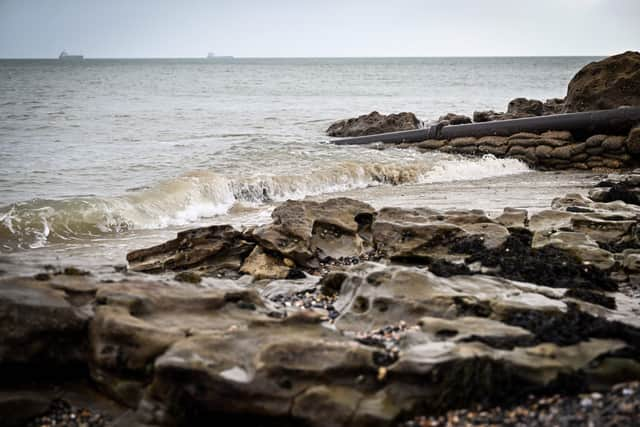Greenpeace: Britain’s most sensitive wilderness areas flooded with raw sewage for 300,000 hours
and live on Freeview channel 276
Almost 1,200 sewage overflow pipes were discharged in areas that are supposed to be officially protected under conservation rules.
Greenpeace’s investigative unit Unearthed revealed the pipes overflowed for 300,000 hours last year.
Advertisement
Hide AdAdvertisement
Hide AdThe River Derwent and Bassenthwaite Lake, a conservation area encompassing parts of the Lake District, was one of the worst-hit areas, receiving more than 6,600 hours of sewage.
Chichester and Langstone Harbour, an SPA and Ramsar site, received over 3,200 hours of sewage. A study from the University of Portsmouth found over 50 chemicals and e.coli bacteria at 760 times the EU’s safe levels after sewage releases.


The team also found 1,193 raw sewage overflowsdischarge within 50m of a protected area and more than 38,000 hours of sewage were released into or within 50m of chalk streams in England last year.
In total, 515 protected areas were affected with the areas seeing an overall 305,963 hours of raw sewage spilled.
Advertisement
Hide AdAdvertisement
Hide AdUnearthed mapped water company data on sewage spills in 2022 onto maps of England and Wales’ Sites of Special Scientific Interest (SSSIs), Special Area of Conservation (SACs), Special Protected Area (SPAs) and Ramsar sites (wetlands of international importance) to identify every pipe that discharged within 50m of a protected nature site - Defra’s own definition of a “high priority” discharge site.
In the four categories of protected areas across England and Wales:
- 295 affected Site of Special Scientific Interest were affected
- 100 Special Areas of Conservation were affected
- 72 Special Protection Areas were affected
- 48 Ramsar Sites were affected
The team compared maps of these areas and used this information to identify every pipe that discharged within 50m of a protected nature site in 2022.
Where are the areas most hit?
Across England and Wales, some of the areas heavily hit with sewage spills are:
- The Solent and Dorset Coast, a large Special Protected Area spanning West Sussex, Isle of Wight and Dorset coasts received 14,174 hours of sewage spills last year. Bognor Regis (Aldwick), a coastal town popular during the holiday season, falls within the SPA and has a ‘Poor’ bathing water status this year. Human waste was identified as the main cause of pollution.
- The River Derwent and Bassenthwaite Lake SAC/Bassenthwaite Lake SSSI, encompassing parts of Cumbria, including the Lake District, was also one of the worst-hit areas, receiving 6,673 hours of sewage in 2022.
- Pembrokeshire Marine SAC, which extends around the Pembrokeshire coast and offshore, is one of the largest marine designated SACs. It received 6,997 hours of sewage last year.
- River Usk/Afon Wysg SAC runs through the Brecon Beacons National Park, which was recently renamed Bannau Brycheiniog in the Welsh language. 9,717 hours of sewage poured into this SAC last year.
- River Wye/Afon Gwy (England and Wales SACs), is an area that has been in the spotlight recently because of the high levels of agricultural water pollution currently damaging the river. The area also receives high amounts of sewage releases, which totalled 16,475 hours last year.
- Plymouth Sounds and Estuary SAC, which straddles the borders of Devon and Cornwall, is another popular holiday destination that was heavily hit with sewage discharges, receiving 11,436 hours in 2022. Earlier this year, the utility company South West water was fined £2.1 million for multiple illegal sewage incidents dating back to 2016, including one discharge from Torpoint sewage treatment works into Plymouth Sounds.
- Morecambe Bay and Duddon SPA (also an SAC) received 14,786 hours of sewage. Locals have reported issues with swimming amongst human faeces around the bay on visits to the beach after heavy rainfall. The newspaper Lancs Live reported that people were avoiding swimming in the sea and had described a strong odour coming from the coastline.
- Humber Estuary SAC, SSSI, Ramsar, SPA received 3,470 hours of sewage. In 2019, researchers found high levels of pharmaceuticals in the water here, with the highest concentrations of ibuprofen found on the globe, this came mostly from regular discharges from wastewater treatment works but raw sewage also contributed.
- River Avon SAC that runs from Bristol to Bath received6,960 hours. Swimmers have reported getting seriously ill from swimming in this river.
Advertisement
Hide AdAdvertisement
Hide AdMegan Corton Scott, Political Campaigner for Greenpeace UK, said: “These are the casualty figures from a war which nature is losing, badly. Private water companies treat our countryside as a toilet, and their vandalism doesn’t stop at some of our most sensitive conservation areas. Beloved lakes, beaches and rivers, rare wildlife habitats, sites of special scientific interest are being sacrificed so water company bosses and shareholders can continue to reap huge profits.
"The idea that the sewage industry could be shamed into doing the right thing has been tried and failed - nothing matters to them except profit. The only way to force them to clear up their mess is to make all of their dividends and bonuses dependent on actual results. Instead of long-term targets and empty threats, ministers should actually force the water companies to do the job we pay them for, starting now.”
The government’s current Storm Overflow Reduction Plan, published last summer, outlines a target to ‘improve’ 75% of pipes discharging into high priority areas by 2035, extending to all high priority areas by 2045. For many of these sites, work on spill reduction won’t even begin for over a decade.
Comment Guidelines
National World encourages reader discussion on our stories. User feedback, insights and back-and-forth exchanges add a rich layer of context to reporting. Please review our Community Guidelines before commenting.
